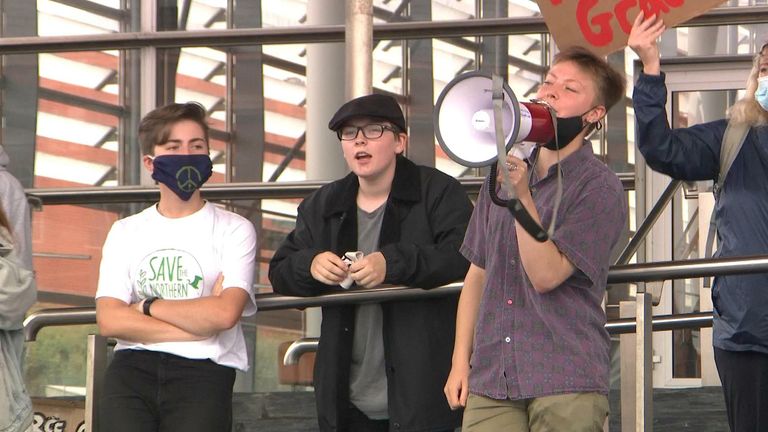The government and the exams regulator are being threatened with legal action as pressure mounts for a rethink over the awarding of A-level grades.
Hundreds of angry students are demonstrating in Westminster, with some chanting "get Gav gone" and "come out Gavin" as they protested outside Education Secretary Gavin Williamson's departmental building.
Footage has also been shared online of one student burning her A-level results in Parliament Square.
Around 280,000 students saw their A-level grades fall by one grade or more from their predicted results following the introduction of a new "moderation" algorithm, which was put in place after the coronavirus lockdown led to exams being cancelled.
Further confusion was added to the row on Saturday night when Ofqual, the exams regulator, suddenly suspended its own policy for students wishing to appeal their results.
Advertisement
Just hours after Ofqual published its criteria for mock exam results to be considered as the basis of an appeal, the guidance was withdrawn and the regulator said it was reviewing the policy.
"Earlier today we published information about mock exam results in appeals," Ofqual said in a statement.
More from A-levels
"This policy is being reviewed by the Ofqual Board and further information will be published in due course."
Mr Williamson had been accused of abandoning his promise of a "triple lock" for students following the announcement of Ofqual's criteria for using mock exams in appeals.
He has said pupils can use their mock results, resit exams in the autumn, or accept the grade they had been awarded.
The Ofqual guidance said that if the mock result was higher than the teacher's prediction, it was the teacher's prediction which would count.

Conservative MP Robert Halfon, the chair of the House of Commons' Education Committee, branded Ofqual's actions "unacceptable" as he called for the "huge mess" to be sorted out.
Many other unhappy Tory MPs were said to be making their views known to the party's whips.
Labour claimed the A-level results row was a "fiasco turning from tragedy to farce" as they called on Boris Johnson to "get a grip".
The party's leader Sir Keir Starmer has tweeted: "Weeks of chaos, confusion and incompetence. We need a return to teacher assessments for A-level results and urgent action to avoid the same injustice for GCSE students.
"Boris Johnson has been invisible during this crisis. He needs to take personal responsibility, and fix it."
Labour demanded Mr Johnson holds a news conference within the next 24 hours to explain to parents, teachers and young people "how he will end this historic injustice".
Paul Whiteman, general secretary of the NAHT head teachers' union, said it was "quite clear that the rules are being written and rewritten on the hoof" and that thousands of students were "suffering" as a result.
He called on the government and Ofqual automatically to review the 25,000 results which were two or more grades below their teachers' predictions.
Students have been left furious by the new system, with many losing their places on their chosen university courses after not meeting the required grades.
School leavers entering a highly-competitive jobs market are also fearing the impact of their predicted results being downgraded.
Campaigners have promised to begin High Court proceedings against Mr Williamson and Ofqual this week unless they perform a climbdown on the use of the algorithim.
Jolyon Maugham QC, who heads the Good Law Project, told Sky News: "This morning we sent a letter to Ofqual, copying in Gavin Williamson.
"We make three points in that letter; we say, firstly, the absence of an appeal system – a meaningful appeal system – for individual students is unlawful.
"Second, we say the system – taken as a whole – is so unfair as also to be unlawful.
"And thirdly, we point to Ofqual's statutory obligation to ensure that accurate grades are delivered and we say that its failure to do that, again, is unlawful."

Ofqual has defended its moderation of A-level grades, saying that some schools and colleges had submitted "implausibly high" A-level predictions.
But Mr Maugham argued the regulator "hasn't really paid enough attention to the quality of individual students".
He accused Ofqual of "embedding structural inequality" following widespread criticism that the regulator's algorithm disproportionately penalised students from schools in disadvantaged communities.
 Read More – Source
Read More – Source[contf]
[contfnew]

sky news
[contfnewc]
[contfnewc]





